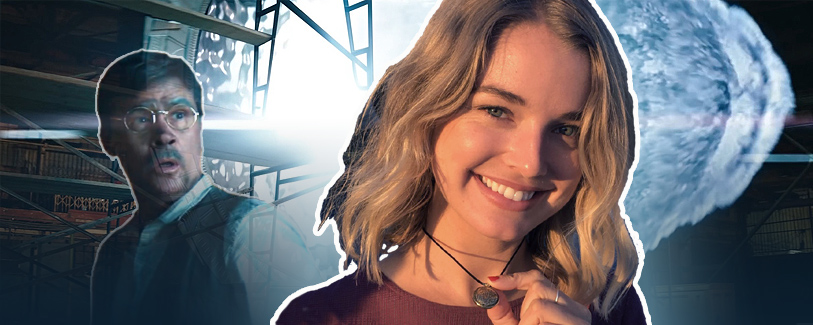
Some fictional characters are foundational for the universe they inhabit. For Stargate, Catherine Langford is one such character — the woman who spent her entire life with the discovery of the gate, working to unlock its secrets, and eventually to make the Stargate program a reality. An astounding six different actresses have played the character on film and television, and at different ages. The latest is actress Ellie Gall, who headlines the 2018 Web series Stargate Origins.
GateWorld caught up with Ellie this summer ahead of her appearance at San Diego Comic-Con, just as the feature cut of Stargate Origins: Catherine was released — pulling together the 10 webisodes into a single movie. In our conversation we talk about her early acting career in Australia and moving to Los Angeles, being cast in the new Stargate project, and the rigorous demands of filming. She also shares her thoughts on what character of Catherine Langford represents, and how she went about making the character into her own.
Our interview with Ellie Gall runs about 32 minutes, and is available for you to listen to via the player above — or at the GateWorld Interviews podcast! You can also be among the first to see the newest interviews by subscribing to GateWorld’s YouTube channel.
GateWorld: Hello, and welcome! My name is Adam Barnard and on behalf of GateWorld.net I’m sitting down with actress Ellie Gall, who played Catherine Langford in Stargate Origins. Ellie, thanks for joining us today!
Ellie Gall: Thanks for having me, Adam!
GW: Today is pretty wild because at the time we’re recording this the feature cut just came out. I went to iTunes yesterday, and on the front page in the “New and Noteworthy” — right next to the studio releases — I see Stargate Origins. So now that this project has new life, that must be really exciting for you to get to see that come out in two different formats.
EG: It is really, really exciting. It’s really cool that now people who maybe didn’t have access to Stargate Command can now go and see it. All my friends who didn’t finish watching it can now watch the feature cut from start to finish.
I actually haven’t watched it yet. So that will be really cool to see my work from start to finish. I haven’t gone and watched all the episodes back to back since they’ve come out. I watched them as everyone else probably did.
GW: Absolutely. And the two formats are very different — interesting in their own right. Because [with] the Web format, the Web series, the digital episodes you have digestibility. You can kind of jump in and jump out of the narrative. With the feature cut, when you watch it all the way through — it has the new title sequence, it just feels epic …
EG: Oh, does it?
GW: Yeah! Yeah, it has those additions. It’s super-cool. So it has this real engaging, kind of full sense of adventure — where the last one you were kind of digesting it in chapters, kind of like you said.
EG: Yes, definitely.
GW: So in terms of your career: You’ve been acting for quite some time, and I believe you acted in your home country before you came to the U.S. Can you tell us a bit about how you grew up, and how you got into the industry and realized you wanted to be an actress?
EG: I think I always knew that I wanted to do it. I can’t specifically pinpoint one thing that was like, “Yes!” I think that going to the movies … not going a lot as a kid, and it being something spectacular and inspiring, and really getting my imagination going and seeing something that seemed really far away and unobtainable and glamorous, I guess — I wanted to do it. I was very stubborn as a kid. I was probably a lot like Catherine was as a kid. I knew what I wanted, and I wasn’t always sure how to get it but I was sure that I would get it.
I started off in a small agency doing some catalog modeling, auditioning for commercials, booking some commercials, and then starting acting classes. All my training started on camera. So I think that probably helped me mostly as a young kid booking things.
When I was 15 I finally booked my first role on a TV show called Puberty Blues, which is a really, really amazing show. If anyone has the time to watch it they should definitely watch it. It’s about the 70s in Australia and the culture in Australia, and about two young girls who want to be part of the popular group, and the misogynistic culture in Australia at that time. It’s a really, really beautifully, well-made show.
Working on that, because it was such a recognized show, then led to me getting — what did I do after that? I did a Disney show for Australian Disney. It was almost like a Web series, actually. It was uploaded onto YouTube and then it would be played in between shows on Disney in Australia.
GW: So doesn’t Australia have a pretty rich TV market for original content? I guess a lot of times Americans focus on the shows that are shot here and in England, and that’s it.
EG: Yes.
GW: But there are productions and actual TV shows that are tapping into certain countries’ culture. So did you experience that, and kind of found a niche in Australian TV?
EG: Not really, to be honest, because the industry is very small. I had success in Australia, and my success wasn’t that big — but for me I ended up landing a guest role in A Place to Call Home, which was a very well-respected show at the time with really great, established actors in Australia. But it’s a very small industry, and you see a lot of the same faces all the time, in the same shows. And for me it’s gets very boring to watch the same people do the same kind of things.
They’re not making TV for young people as much as they are here, because network television in Australia is watched by older people — like my parents. There are some really good shows. Please Like Me — that’s a really great show. (What else are some good ones to come out?)GW: Didn’t Margot Robbie get her start in Australian TV?
EG: She did — in Neighbors, which is a soap opera, funnily enough. So there’s Neighbors and there’s Home and Away. I did one episode of Home and Away, which is kind of like your golden ticket. “Oh, OK” — when you go to America they’re look at that and go, “Oh, cool, you’ve done Home and Away or Neighbors. You’re good to go.”
GW: So when did you make the jump from Australia to the United States? And what was the catalyst for that?
EG: I moved just over a year ago now. So basically I’d had a manager for maybe three or four years. I’d been self-taping in Australia — sending my auditions over [but] filming there. I’d booked a pilot at the end of 2016 in Australia that shot in Canada. And then I ended up booking Ash vs. Evil Dead at the beginning of 2017.
GW: Oh, that’s awesome! That’s a great show.
EG: Yeah! Oh, it’s a really good show. That was a lot of fun. We filmed that the beginning of last year. Then once the pilot didn’t get picked up my manager and I decided we’d apply for my visa, and once my visa got approved I was like, “OK, I’m going to come to America and do it over here!” Because it seemed like I was having more success with roles here than was going to be offered to me in Australia.
It felt like it was time to commit to being an actor, and really immersing yourself in it here. Because in Australia — I mean, for me I was living close to the beach, and everyone kind of does their own thing, and not everyone that you surround yourself with is a creative or understands the industry.
GW: Certainly, yeah.
EG: Here in L.A. everyone — if they’re not in it, they kind of understand it. And there’s a level of artistry here that, for me, I didn’t find in Australia. Or communities that understand what you’re doing. It’s really cool to be here in L.A. I’m really, really loving it.
GW: So if you came here, you said about a year ago, that was right before you got cast in Stargate Origins. You got cast within months of first arriving.
EG: I officially moved end of May, and I got cast in Stargate [in] October. I think it was early October. So I was here — it felt like a long time before I booked Stargate! How many months is that?
GW: … May to October? I think it’s five. The Deadline article that came out was October.
EG: Yeah, it was all very, very quick.
GW: So did you go in for any chemistry read? Or did you just self-tape and go straight to offer? How did your casting process come about, and how many rounds did you have to do to get the role?
EG: I self-taped and they offered it to me. My manager had sent them — they were familiar with my work, and they had seen other material of mine. So they were basing that off of other things.
But it was very quick. We started shooting within a week of me being offered the role. Once you get offered a role then there’s the whole [process where] you have to work out your contract, and wait until the contract is [done]. Because sometimes you get offered a role and if you haven’t already signed a contract — because sometimes when you test for a role you’ll already do all your paperwork, so that once they offer it to you it’s yours. It wasn’t actually mine until Tuesday, and then I went into rehearsals on Wednesday. And then Thursday and Friday we had another rehearsal, and then shooting Saturday.
It felt very, very quick. It was like, “Oh, OK! I’m a working actress in L.A. now. This is really fun!”
GW: Right! A lot of waiting, and then full throttle.
EG: Yeah. I think also I’ve gotten very used to the not waiting. I think a lot of actors in L.A., especially people who don’t have other jobs to support themselves, wait a bit too much.
But something I’m learning now [is] there is always things you can be doing as an actor. There’s always ways that you can be working. On things that people aren’t paying you for — but this is a craft, and there’s always work to be done. And finding the joy and the fun in that is something that I’m really working on at the moment.
GW: I think that’s good wisdom for any facet of show business. One thing I see with a lot of young artists — I went to film school and I’ve been in that community a lot —
EG: Oh, cool.
GW: Yeah, I went to Chapman, which is actually where a lot of the crew [from Stargate Origins went]. Nico [Aguilar] and …
EG: Oh, yes! Nico, D.O.P. [Director of Photography]. Rachel the script supervisor …
GW: I was in classes with them just like two or three years ago. It’s weird.
EG: That is weird! Wow.
GW: With a lot of artists who have dreams of the more exclusive roles — musician or actor — they’ll work really hard and then once they get into a place where they start to get some visibility, they kind of sit back and wait for their “big break.” It’s like, “Wait till I get an agent.” Or “wait till I get a better manager.” “Wait till I get this role!” You still have to go out and practice, even if no one’s watching.
EG: Yes — you really, really do. And I think that’s why a lot of actors get disheartened here in L.A., or in any stage of their career. Because they’re always waiting for someone to validate their talent, or say that they can do work. There’s always work that people can do on themselves, and for themselves and for their “instrument” really, which is essentially what it is. Yeah.
GW: So when it comes to the character of Catherine Langford, you’re the sixth actress to be portraying this character.
EG: Yeah, wow!
GW: When I was preparing for the interview I was thinking, “It’s not like a situation like, say, with Han Solo in the Solo movie,” where there is this iconic character and it’s Harrison Ford. It’s always been known as Harrison Ford. And then Alden Ehrenreich has to come in and figure out how to “blend” interpretations.
With you it’s like there’s five other actresses! It’s not like you can single in on one performance and say, “I’m going to try to match this.” So how did you go about crafting the character of Catherine — your iteration of Catherine — and inform those specific performance choices?
EG: I think for me it was really just about knowing her history, knowing her relationship with her father, and her situation that she was in in Egypt, and what she wanted. I think I learn a lot working in this medium, in this genre, that you have to be so present but you also have to know everything that’s going on. And you have to see everything that isn’t there. Because so much of it is imagined, and if you’re not clear or specific, if you don’t understand what’s going on, then the audience probably won’t understand what’s going on.
But I think as well we’re lucky we worked on something that is so established. And the fans are so loyal, and they’re so passionate. And that they are so invested in the world that they see things — they’re going to see that imagery just as clear as we probably will.
GW: Certainly. And with Catherine, your character is very much the protagonist — and not a passive protagonist. Someone who makes decisions that continue the story. And makes very risky decisions, very bold decisions that many other characters would shy away from. And many others (like Beal or Wasif or others) are a little cautious about.
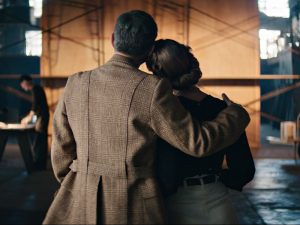
Catherine’s relationship with her father (played by Connor Trinneer) provided Ellie with a core to understanding the character.
How did you bring her straight-forwardness to life? Did you reference any other performances or characters? What do you see as her core values and traits?
EG: I didn’t reference any other characters. I didn’t reference any other Catherine performances because I didn’t want it to feel mimicked or copied. And also, given the time frame that we had, I don’t think it would have been the best use of my time to come home and try to copy down all the features!
She’s very strong-willed. For her it’s all about her father. And she acts very fearlessly, which is very careless. There’s a difference between fear and bravery. To be fearless and to be brave are very different things. Because to be brave — for me anyway — is as if you’ve thought through what you’re going to do and you know the risks, and then you go and do it anyway. Whereas Catherine — she doesn’t want to think of the risks, because that’s going to be a setback. She’ll just do it.
And the fact that the boys — as reasonable as they are, they hold her back. It’s a fun little dynamic to play with. And it’s really fun to really command two men — of the time, as well —
GW: [Laughter] Yeah, in the 1930s which was a very different time in terms of gender roles.
EG: Yes, yes. I mean now you’d have a character like that. In this context, in this day and age, it wouldn’t be so shocking. But then, for her to be like that — because she has grown up around a lot of men and she’s never been fully treated like a woman would be in her time. She has always been respected. And so with that she backs herself. And she has authority when she says things.
That was cool to play. That was really cool to play.
GW: Right, absolutely. I know that with characters like Beal they’re so “proper” and British. Probably at the time — I’m not saying this is right, I’m saying it for historical context — they wouldn’t want to be bossed around by a woman.
EG: No! And that’s why his character is so fun and interesting. Because he lets her do that. He is open to me telling him what to do — for Catherine telling him what to do. If anyone kind of understands the historical context they’ll know — he really, really cares about her, to let her do that to him. And what he’s doing is incredibly brave, and scary.
For me that’s why I think the dynamic works so well. Because Shvan, who plays Wasif, just is completely blown away by how [blindly] he’s following me.
GW: Yeah, right. It’s kind of like a row of characters — you go, so then Beal goes, and then Wasif goes as a result. You’re kind of dragging all these people along with you!
How was that dynamic with Captain Beal — or with Philip Alexander? Did you get to add some of your own interpretation of the romance, or the conflict between their two cultural positions and what they are used to? Or was that something that was really in the script?
EG: It was really in the script. But Philip’s really amazing. He’s a really talented actor. He brought so much to it. He was very specific about the accent; he was very specific about this person’s body, and the way that they moved. So, for me, it was all there in him — I just had to know what I wanted in him, and he would give everything that I needed to me.
Philip and I, we’re still good friends now. I think we did really form a nice bond on set, and really wanted to make sure that people were invested in us as a couple.
GW: Totally. And one of the big things I’ve heard from both the cast or the crew I’ve gotten a chance to talk with about Origins is that despite a short shoot everyone really coalesced and became a family. Things became very close on set. What do you think brought about that kind of specific camaraderie in this particular shoot, for Stargate Origins?
EG: I think everyone really wanted it to be good. And everyone really cared about making something — because we knew how much people cared about this story, about Stargate. And there’s already so much history, and there’s already a world that’s been created. We knew that we had to perform. We knew that we had to deliver something that people would be [at least] somewhat happy with. We were giving something to people that meant a lot to them.
So I think there’s a lot of … it’s not pressure, but a respect for what you’re working on. And a respect for the people that you’re working with. It’s not easy being on a film set. It’s very hard work, and everyone’s really putting in the hours. It’s long, hard days — and hot usually. It was really hot when we were filming.
GW: I heard the desert was like 110 degrees or something when you were shooting there — like ridiculous with temperatures.
EG: I don’t know! That was hot. I’m not sure if it was 90 … it definitely hit 100. It definitely hit 100.
GW: Any time you hit triple digits, that’s tough to be out in the sun that much. You don’t have umbrellas during all the takes! You’re getting really pelted by the sun.
EG: Yeah! I’ve been cutting together some scenes from Stargate. So I’ve been watching the desert scenes a lot. I’m just like, “Wow! You were holding it together so well, Ellie. That was tough.”
GW: [Laughter] Right. And some of the most classic Stargate scenes I feel like came from the stuff that you shot in the desert. Specifically one scene with you and Kasuf (I’m just going to say it, because I can’t do the cool accent that Daniel Rashid does — Cha-suf! — the hard K). There’s a great scene where you kind of pull him aside and you get into a deeper dialogue with him, about the fact that he is essentially a slave but doesn’t realize he’s being abused because he thinks the “gods” are infallible.
That was a really cool scene. How was it to play that? It gets deep. There’s plenty of real-world parallels with that.
EG: Yes. Fun fact about that scene: They wrote that, they added that in pretty much a day and a half before, when we were on our way out to the desert.
GW: Oh, really?
EG: Yeah! And then that gave me and Daniel, they gave us the Egyptian to learn the night before. So last minute! And then we had the big desert shoot day, which was one of the most exhausting days of my year, for sure. And then we had to get up and do that.
So that was a hard scene for me to do, because that language for me just did not come organically. But it was a really important scene and I’m really glad that they added it in. Because it was really important to question what was going on, and what I had seen, and that it didn’t seem right to me. It is a really important moment for Catherine to have with Kasuf. Otherwise it almost seems like they don’t really care.
GW: Well it’s because I think they don’t see anything wrong, so they don’t see a reason to care. When you have that kind of brainwashing your character might very much care that this is happening, but there is no way to get them to realize that. You can’t pull the scales from their eyes. It’s just [that] that is their world.
GW: And someone who just showed up yesterday, they’re not going to say, “Oh, yeah! You’re right. I’ve been wrong for 20 years.” It’s a hard realization for a character to come to.
EG: Yeah, it really, really is.
GW: So apart from the desert scenes, which seemed quite rigorous and spontaneous and pretty crazy to shoot, what were your other favorite parts of shooting the show? A memory, or a scene that you’ll take away that is really a golden nugget from the experience shooting Stargate Origins?
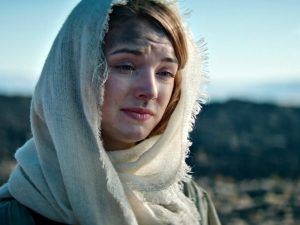
An interaction with Kasuf late in the story is full of emotional resonance … and was a last-minute addition to the script.
EG: I loved being in the warehouse. I loved that location, that space. That in itself felt like a character in the film. And there was so much richness in there that was just already there — it wasn’t even part of the set dressing or anything. It was just really cool to be there.
GW: Where did you guys find that warehouse? Was that just in L.A.?
EG: Yeah, it’s in L.A. — in downtown L.A.
GW: It looks so rich — it’s almost like it was designed, because it has so much old character to it.
EG: Yeah. And I think most of it was just like that. Apart from putting up the Stargate and adding specific, time-appropriate props there wasn’t that much to it.
GW: So outside of production, you have the set experience and now Origins is out in both the Web format and the feature format. How has it been to join a venerable sci-fi franchise, and go to the conventions (maybe get recognized a bit more)? How has your life changed, or your career changed, in a post-Stargate experience?
EG: Probably not as much as people might think. I went to Comic-Con while we were still filming. I haven’t gone to any other conventions yet. I’m thinking I might go to the one in Vancouver …
GW: And that’s the one where it’s crazy — even the supporting characters from older shows (not even the regular cast members) ten years later they’re still going to conventions, because the fandom cherishes these characters so much.
EG: Yeah, it’s a very loyal fan base. I haven’t gone to many. There’s one coming up in San Diego soon, isn’t there? The biggest one — Comic-Con.
GW: Comic-Con, yeah. Are you going to that one?
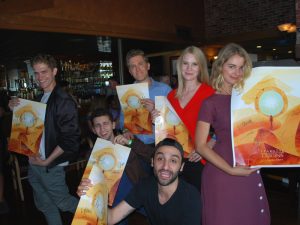
After this interview Ellie did join her cast mates at San Diego Comic-Con. From left: Philip Alexander, Daniel Rashid, Aylam Orian, Shvan Aladdin, Sarah Navratil, Ellie Gall
EG: I’m not sure yet. I should think about that again. Maybe we will! I think it’s this month though, isn’t it?
GW: It’s July — which is crazy, because not even a year ago was when they announced Stargate Origins. And now we’ve already — the feature cut’s already out and you have to look ahead to the future of Stargate. It’s a pretty fast time table.
How was it actually getting to shoot? Did you guys have a lot of time to do it? I heard it was kind of a pretty brisk shoot, so you had to rehearse extensively going in?
EG: They had longer rehearsals than I was a part of. Because we had five weeks of shooting, and they had maybe a week and a half of rehearsals, but I only got to come on at the end because I was cast so late in the process.
But it was pretty quick. It was a quick shoot. But we had enough time to do everything. I mean you never have as much time as you probably want to make things, unless you’ve got a giant budget or you’re doing a big feature. Or even network stuff gets done really quickly. That’s just where your prep has to come in — you have to be ready to go.
GW: Yeah, absolutely. At the beginning of the story — I’m just thinking of the character [of Catherine] — she’s been with her father forever. That’s kind of like what we were talking about earlier, where she’s in a different cultural place because she’s spent so much time with her father. Do you think at all [that] she maybe wishes she had more of a traditional upbringing? Or was your interpretation of Catherine Langford that “this is what she was born to do?”
EG: I don’t think she wishes — I think she would have thought about it. I think she would have fantasized about it. I think that’s where the romance with Beal comes from. That intrigue of living a normal life, or getting to grow up around boys and go to school. But I think that she feels lucky that she’s been able to grow up in an environment like that, and not be — not a victim of her generation, but a victim of her time and for women of her time that she didn’t have to go off and be a trained homemaker.
GW: And the cosmic significance of what she’s working on is pretty apparent, too, as she goes on. So there’s that kind of extra significance to the fact that she does live an extraordinary life.
EG: Yeah. She doesn’t have the exposure, though, that we do now — I think people back then were a lot more present in their environment, because there wasn’t as many distractions. You didn’t know what was going on in other places, like we do now. You don’t know what the world looks like outside of the world you’re in as much. You just have ideas, or you get information, and it’s really slow. So you would be so much more present and involved in the place that you’re in.
GW: And in terms of her character and how she chooses how to act in these positions, her father being kidnapped is kind of the MacGuffin in a sense — it’s what gets the story started and what gets her involved, gets her to step through the Stargate.
About halfway through she starts to realize it’s a bit bigger than her father, when she realizes she is well-accustomed with the culture of the Stargate and now the power of the Stargate. She realizes she also has to stop the Nazis and has to stop a breach. How do you think she balanced that? If she was put in a situation where it was one or the other — “I get to rescue my father or potentially open up a portal to another world for evil forces” — would she make an emotional decision? Would she have to stick with the rational? How would that work?
EG: What do you mean — like would she sacrifice her father, or choose one or the other, her father or the world?
GW: Kind of. In this story, in this moment of her life, would logic overtake her and say “I have to sacrifice for the greater good?”
EG: No, I think she would choose logic. She would break — that would be the worst thing that could ever happen to her. But I think she cares about things more deeply, to decide that having a dad around and potentially ruining the world … yeah, she is a “big picture” person when she gives herself the time to think about things.GW: She’s kind of the voice of reason, which was cool. Even if she’s braze she is making the decisions because there’s a righteousness to her thought process, where “this has to happen.”
EG: Yes, yeah. She’s very “righteous.”
GW: So you do find yourself very similar to Catherine, would you say?
EG: There’s definitely elements of her in me. With all the characters I get to play I have to find a way to make them my own, or how I can use parts of myself to bring them to life.
But there are a lot of differences. She’s very intellectual — an academic, essentially. And I’m … nope, that’s not me! [Laughter] But she is very headstrong and stands up for herself, and can assert herself. And I think Catherine probably helped me to be more like that in my life and in my work. So it was really fun to get to play someone like that, because she is like a little bit — but I think she’s further from who I am as Ellie.
GW: Well that makes sense. Her tenacity, I think, was the highlight of the story and what kind of brought that spirit that we know from the feature film. Because she is — decades later, albeit — but she is the matriarch of the Stargate program. And she is kind of what sets the world we know, the universe we know of the TV shows, and the action.
EG: Well I’m so glad that I go to be a part of it. I hope that girls watch that, and women watch that, and think “I should assert myself around certain people” or “I can go after what I want” or “I should stand up for myself or the things that I believe in.”
They are her core. You asked me before what her core values are. They’re her core values. And I hope people see that. And I hope that they maybe take it into their own lives or [are] inspired to live more of that path.
GW: And now that the feature cut is out it’s a great time to go back and relive that adventure again! It’s on iTunes, all the digital platforms … It’s pretty big because now it’s not just new Stargate; it’s a new Stargate movie. We can put it in the catalog with the other films.
So for you, Ellie Gall, what is next in your career? Do you have any exciting projects coming up you can tease? Looking to do more film or TV?
EG: I’m actually looking to do more theater. Hopefully working on developing my own projects now. Yeah! I’m very drawn to having a more enriching acting experience at the moment, and really working on my technique and finding some good writing. Maybe even try some writing myself. Just doing things that I haven’t tried before.
Obviously working on a film set, or whatever set, would be lovely. But just kind of self-directing at the moment [and] taking it into my own hands. Maybe like Catherine would!
GW: Well it’s so great to have had you on, and to get to sit down and talk about Origins. We look forward to following your career in the future .. and hopefully getting to see you around at a few fan conventions over the years, now that you’re part of the family!
EG: Yeah, definitely. You’ll definitely see me soon. I’ll be around.
Follow Ellie on Twitter: @Elli_Gall



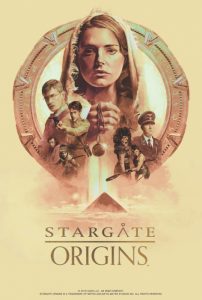
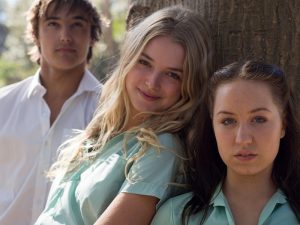

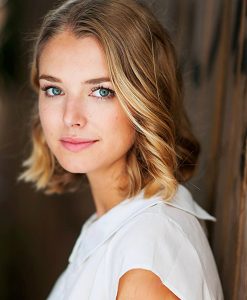
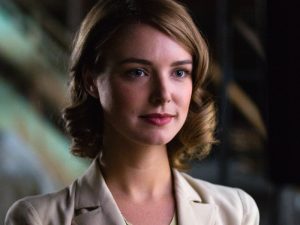
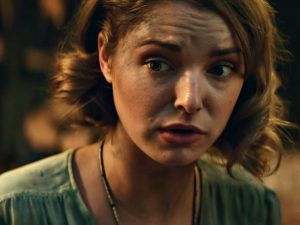
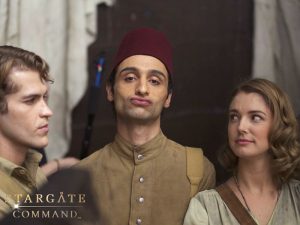
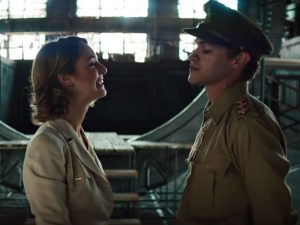
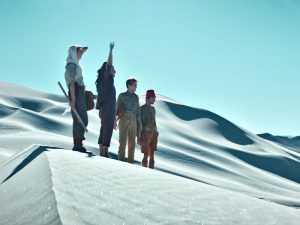
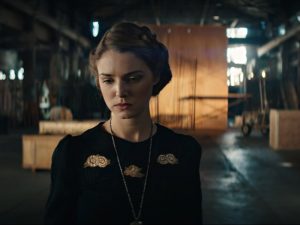
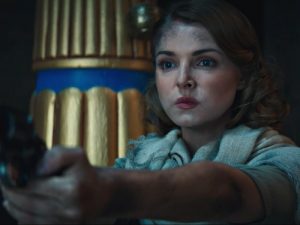
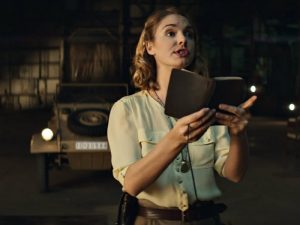
She was OK in the role, but she had the wrong accent. In any case, the material written for her was SOOO weak. And her fellow castmates were not good actors at all, other than Trineer–who was sadly miscast.
Margo Robbie was in Neighbours? must’ve been after i stopped watching